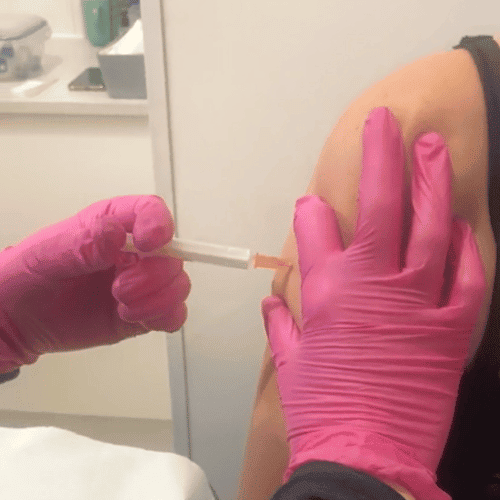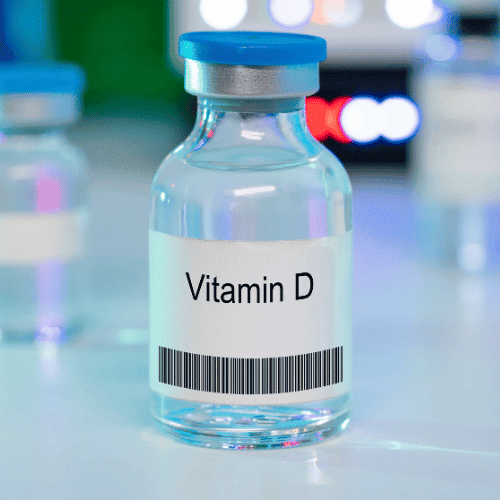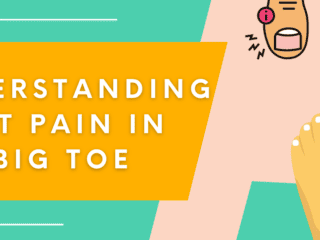Vitamin D helps keep the bones, muscles, and skin healthy, making it one of the most crucial vitamins for the body. If you think you’re deficient or need more of it, Vitamin D injections help fill in your vitamin needs.Â
If you want to know more about getting Vitamin D shots, this article will provide everything you need to know – its benefits and risks and commonly-asked questions about it.Â
- What Are Vitamin D Injections?
- What Does Vitamin D Do For The Body?
- Understanding Vitamin D Injections
- Who Are Vitamin D Injections For?
- Benefits of Vitamin D Injections
- Risks & Side Effects of Vitamin D Injections
- Comparing Vitamin D Injections To Other Forms Of Supplementation
- FAQs
- Recap
- Conclusion
- Related Articles
What Are Vitamin D Injections?
Often prescribed for those with absorption issues or specific health conditions, these injections can effectively maintain optimal vitamin D levels but may cause side effects.
*Always consult a healthcare professional before use.
What Does Vitamin D Do For The Body?
Vitamin D is a nutrient that helps build and maintain healthy bones by regulating the production of phosphate and calcium, the latter being the bones’ primary component. This fact also extends to dental health, as vitamin D helps prevent tooth decay and maintains healthy gums. It also has anti-inflammatory, antioxidant, and neuroprotective properties that benefit the immune system and cognition.
Studies also prove vitamin D helps provide musculoskeletal benefits, as it promotes muscle protein synthesis and improves physical performance. One study showed that taking vitamin D3 supplements (along with whey protein) helped improve muscle mass gain and strength. Another research noted that taking vitamin D before exercising lessens muscle fatigue and better recovery post-exercise.
Symptoms Of Vitamin D Deficiency
Symptoms of vitamin D deficiency include:
- Fatigue
- Sleeping problems
- Hair loss.
- Muscle loss and weakness.
- Low appetite
- Getting sick more easily
- Bone health-related problems like rickets
- Anxiety, depression, and frequent mood changes
A person may not get enough vitamin D for various reasons – They may not get enough vitamin D in their diet or have malabsorption problems hindering them from absorbing vitamins. In some cases, their liver or kidneys are unable to convert vitamin D to its active form in the body. Having medical conditions, a history of having weight loss surgeries, and taking certain medications also impede vitamin D absorption.
External factors like not getting regular exposure to sunlight (which provides vitamin D) is also a common cause. The area where you live, skin pigmentation, and lifestyle choices can all interrupt the production/absorption of vitamin D. Not eating enough foods rich in vitamin D can also affect one’s health.
Understanding Vitamin D Injections

Supplementing with vitamin D is an effective way to boost vitamin D levels and improve overall health and wellness. One can take them either in supplement form (capsules, chewables, tablets, powder supplements, etc.) or through injections/shots.
Types of Vitamin D Injections
Vitamin D injections are administered by a healthcare provider. The frequency and dose will depend on the individual’s own health needs and the severity of their vitamin deficiency.
There are two main forms of vitamin D:
Vitamin D2 (Ergocalciferol)
Vitamin D2 is mainly used to aid the body absorb calcium and phosphorus better. It’s also used to treat bone-related disorders that cause calcium or phosphate deficiency. Additionally, it’s used as a supplement in breastfeeding babies. It is mainly synthesized by plants.
Vitamin D3 (Cholecalciferol)
Vitamin D3 is the natural form of vitamin D produced by the body from sunlight. It promotes bone growth and remodeling, muscle contraction regulation, and the conversion of blood glucose (sugar) into energy. This form of vitamin D is considered better since the body absorbs it better and faster.
Who Are Vitamin D Injections For?
Here are some of the reasons why you might need a vitamin D injection:
- You have a severe vitamin D deficiency.
- You are unable to absorb vitamin D from food or supplements.
- You have a medical condition that makes it difficult for your body to produce vitamin D.
- You are taking medications that can interfere with vitamin D absorption.
- You are pregnant or breastfeeding.
- You are an older adult.
- You have a dark skin tone.
- You live in a northern climate where there is less sunlight.
If you think you might need a vitamin D injection, talk to your doctor. They can order a blood test to check your vitamin D levels and determine if you need an injection.
Alternatively, if you’d prefer to take your tests at home, there are options available that have pretty fast turnaround times. This one from Everlywell is affordable and comes from a trusted brand.
Are Vitamin D Injections Only Available via Prescription?
Yes, vitamin D injections are only available by prescription. They are not available over the counter.
Vitamin D injections are typically prescribed for people who have a severe vitamin D deficiency, or who are unable to absorb vitamin D from food or supplements.
Vitamin D injections can be given as a single dose, or as a series of injections over a period of time. The dosage and frequency of injections will vary depending on the individual’s needs.
Benefits of Vitamin D Injections

Since vitamin D injections are mainly used to fill in vitamin D deficiency, they can yield the vitamin’s most important benefits:
- Improves bone health – Vitamin D promotes calcium absorption by regulating the amount of calcium in the blood, which is necessary for strong and healthy bones, maintaining bone strength, and lessening the risk of fractures and developing osteoporosis.
- Ensures proper and smoother blood circulation – Vitamin D helps keep the arteries and blood vessels loose and relaxed to support proper blood flow and lowering blood pressure.
- Strengthens immune system function – Vitamin D is crucial for immune function, as it strengthens the immune system and helps fight off bacteria and viruses to lessen the risk of infections and diseases
- Promotes cardiovascular health – Studies show that taking vitamin D can have a positive effect on heart health and can reduce the risk of heart disease.
- Helps promote weight loss – Consistent intake of vitamin D could help aid in weight loss. A study found that vitamin D works with calcium to reduce the production of cortisol, a stress hormone that causes the buildup of belly fat, cutting it significantly.
- Prevents various cancer types – Researchers suggest that adequate vitamin D levels in the body can help reduce the risk of invasive cancer types like colorectal and breast cancers.
- Reduces the risk of type 2 diabetes – Taking vitamin D can help lower average blood sugar levels among individuals with type 2 diabetes. Similarly, it has also been shown to improve glycemic control and insulin sensitivity in type 1 and type 2 diabetes and healthy persons.
- Boosts energy levels – Low energy or fatigue is a common symptom of vitamin D deficiency. It can improve energy levels since it also aids in the function of the mitochondria in the body’s cells, which is responsible for creating energy.
- Improves the skin – Vitamin D has anti-inflammatory properties that can remedy skin conditions like acne, psoriasis, eczema, vitiligo, and overall dryness. It can also stimulate hair follicles to grow.
- Manages mood and depression – Vitamin D injections can help improve mood levels and reduce symptoms of anxiety and depression.
Risks & Side Effects of Vitamin D Injections
Some side effects of taking too much vitamin D include:
- Pain and discomfort at the injection site
- Fatigue/weakness
- Frequent urination
- Dry mouth
- Metallic taste in the mouth
- Nausea
- Vomiting
- Unexpected weight loss
- Muscle or bone pain
- Allergic reactions (e.g., skin problems, wheezing, fever, swelling, breathing problems, etc.)
Excessive vitamin D intake can also increase calcium levels in the blood and put you at risk for hypercalcemia. In some cases, it can result in bone pain and kidney problems, such as calcium stones forming in the kidneys.
The daily recommended amount of vitamin D for adults under 70 is 600 IU, whereas older ones should take about 800 IU. However, an intake of up to 4,000 IU of vitamin D daily is generally considered the safe upper limit.
Drug Interactions
Many medications are known to interact with vitamin D and can reduce the absorption of the vitamin or cancel each other’s effects. These include:
- Anticonvulsants
- Atorvastatin
- Digoxin
- Stimulant laxatives
- Steroids
- Thiazide diuretics
- Cholestyramine
- Verapamil
Comparing Vitamin D Injections To Other Forms Of Supplementation
Injections vs oral supplements
Injections deliver a straight shot of vitamin D into the muscle which allows it to be absorbed faster into the body’s bloodstream, while oral supplements (pills, tablets, powders, or liquids) must first be digested, which lessens the amount of the vitamin left to be absorbed.
Injections vs topical applications
While topical applications (serums, creams, lotions, essences, toners, etc.) help distribute some vitamins into the outer layers of your skin, injecting the vitamin directly into a vein, can help the body’s bloodstream absorb it faster.
Injections vs fortified foods
Eating foods rich in vitamin D like salmon, tuna fish, sardines, beef liver, and beverages fortified with vitamin D can help you increase your vitamin D levels in the body and may cut the need for supplementation. However, if you’re still unable to absorb vitamin D through diets, vitamin D injections can aid and help with faster nutrient absorption.
Injections vs sunlight exposure
Sunlight exposure and vitamin D injections have more or less the same absorption time, with the injections having instant and cumulative results. The body only needs 15 to 20 minutes of sunlight exposure to absorb enough vitamin D to gain its benefits (people with darker skin may need to get more exposure).
FAQs
Who should consider Vitamin D injections?
People who have a vitamin D deficiency should consider taking forms of vitamin D supplementation.Â
How often are Vitamin D injections needed?
The frequency and dose will depend on the person’s health needs and the severity of their vitamin deficiency.
Are Vitamin D injections safe for everyone?
Vitamin D injections are generally safe for everyone, but taking too much of it may cause some side effects and trigger allergic reactions. It can also interact with other medications.Â
Can I get Vitamin D injections without a prescription?
50,000 units of vitamin D2 requires a prescription, while vitamin D3 is available even without one. Check with your doctor or pharmacist before taking any vitamin D supplement.
How much do Vitamin D injections cost?
Vitamin D injections may range from $30 – $50 a shot.Â
Can I give myself a Vitamin D injection at home?
Vitamin D injections are normally handled by a healthcare provider, but one can self-administer even at home.
Recap
- Vitamin D is an important nutrient in the body that benefits bone health, muscle synthesis, and many other functions.
- Vitamin D injections are a faster way of absorbing vitamin D, especially for those who are deficient in it.
- There are two forms of vitamin D injects, D2 (Ergocalciferol) and D3 (Cholecalciferol)
Conclusion
Vitamin D injections help provide a quick and effective way to boost vitamin D levels, especially for those who suffer a deficiency from it, and help them improve their overall health and wellness.
Before taking vitamin D shots or supplements, consult with a trusted healthcare provider and follow the recommended dosages to avoid any potential side effects or health risks.
Disclaimer: this article does not constitute or replace medical advice. If you have an emergency or a serious medical question, please contact a medical professional or call 911 immediately. To see our full medical disclaimer, visit our Terms of Use page.
Related Articles
Best Vitamin D3 and K2 Supplements








